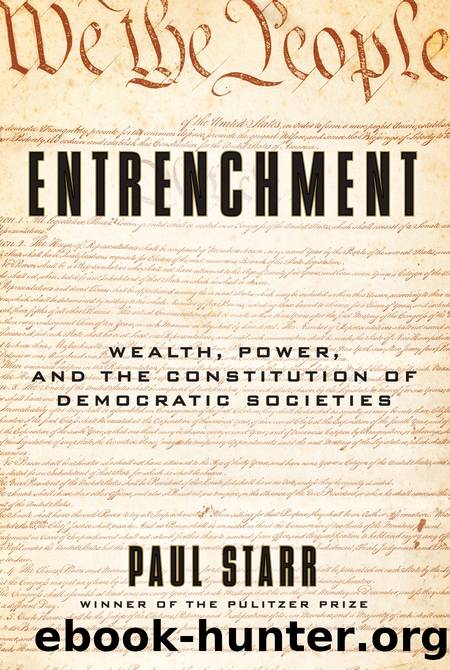Entrenchment by Paul Starr;

Author:Paul Starr;
Language: eng
Format: epub
ISBN: 9780300238471
Publisher: Yale University Press
CHAPTER FIVE
Entrenching Progressive Change
CAPITALISM AND DEMOCRACY CONTINUALLY pose stress tests for each other. Economic crises unsettle politics, while popular movements and charismatic or merely capricious leaders unsettle the stable conditions that business counts on government to provide. Pressure for guarantees of security has come from both directions. Just as elites have sought to entrench property rights and other safeguards of their interests in constitutional law and counter-majoritarian institutions, so the advocates of egalitarian policies have sought to make social rights and protections irrevocable. Neither side has entirely had its way: Entrenched wealth has frustrated progressives, as entrenched forms of redistribution have frustrated conservatives. But for a time in the mid-twentieth century, it seemed as though the tensions between capitalism and democracy had found a resolution. During the thirty years of prosperity after World War II, many observers pronounced the modern welfare state to be an irreversible fact, conclusive refutation of the old dire predictions of increasing misery and relentless class strife under capitalism.
The decades from the 1940s to the early 1970s now stand out as a time of peak economic equality in the advanced capitalist democracies, when “growth with equity” was more than a slogan. While inequalities narrowed, governments took on responsibilities for economic performance and maintained high taxes on top incomes. With rising productivity, low unemployment, and the maturing of modern welfare state programs, conditions improved substantially for people who previously were counted among the poor. Beginning in the mid-1970s, however, as the advanced economies confronted spiraling inflation, reduced growth, and de-industrialization, political power shifted to the right. Market incomes became more unequal, governments cut taxes on the top brackets, and welfare policies came under attack.
Accounts of this reversal have generally followed two lines of analysis. One emphasizes the structural economic and social changes associated with the shift toward a post-industrial economy; the other foregrounds the ideological changes associated with neoliberalism. The two are not mutually exclusive, even though they may be presented that way. In the first view, de-industrialization and the shift toward a post-industrial economy undermined the political foundations of the welfare state. The turn toward neoliberalism, according to some versions of the second account, has been nothing short of a transformation in “the world’s political economic framework,” in which markets have supplanted the state through policies favoring privatization, deregulation, and welfare-state retrenchment.1 In this view, ideological change has driven a radical political shift undermining social protection and increasing inequality.
Yet the trends since the mid-1970s have been more varied than this picture of a neoliberal revolution suggests. Rather than falling as a percentage of gross domestic product (GDP), public expenditures in the advanced capitalist societies have either leveled off or risen. According to estimates by the economic historian Peter Lindert, the net impact of taxes and spending has become more progressive.2 While deregulating their economies in some respects, both the United States and European Union have seen considerable increases in other forms of regulation, much of it in the interest of greater social equality, such as rules barring discrimination by race, gender, sexual orientation, age, or disability.
Download
This site does not store any files on its server. We only index and link to content provided by other sites. Please contact the content providers to delete copyright contents if any and email us, we'll remove relevant links or contents immediately.
The Secret History by Donna Tartt(16618)
The Social Justice Warrior Handbook by Lisa De Pasquale(11489)
Thirteen Reasons Why by Jay Asher(7786)
This Is How You Lose Her by Junot Diaz(5767)
Weapons of Math Destruction by Cathy O'Neil(5034)
Zero to One by Peter Thiel(4823)
The Myth of the Strong Leader by Archie Brown(4789)
Promise Me, Dad by Joe Biden(4444)
Stone's Rules by Roger Stone(4415)
Beartown by Fredrik Backman(4413)
How Democracies Die by Steven Levitsky & Daniel Ziblatt(4396)
The Fire Next Time by James Baldwin(4341)
100 Deadly Skills by Clint Emerson(4075)
A Higher Loyalty: Truth, Lies, and Leadership by James Comey(4031)
Rise and Kill First by Ronen Bergman(4012)
The David Icke Guide to the Global Conspiracy (and how to end it) by David Icke(3881)
The Farm by Tom Rob Smith(3871)
Secrecy World by Jake Bernstein(3782)
The Doomsday Machine by Daniel Ellsberg(3730)
